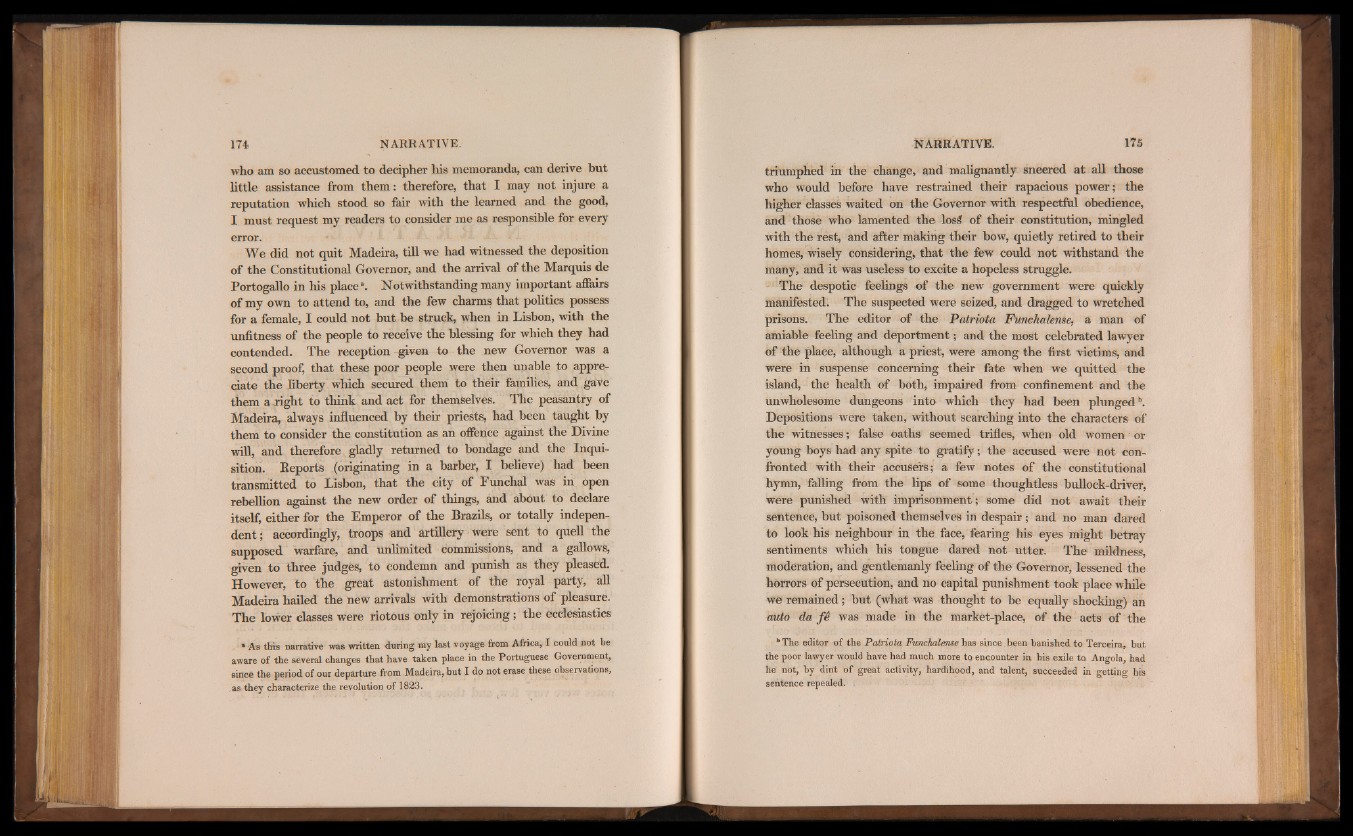
who am so accustomed to decipher his memoranda, can derive hut
little assistance from them: therefore, that I may not injure a
reputation which stood so fair with the learned and the good,
I must request my readers to consider me as responsible for every
error.
We did not quit Madeira, till we had witnessed the deposition
of the Constitutional Governor, and the arrival of the Marquis de
Portogallo in his place*. Notwithstanding many important affairs
of my own to attend to, and the few charms that politics possess
for a female, I could not but be struck, when in Lisbon, with the
nnfitnf-ss of the people to receive the blessing for which they had
contended. The reception given to the new Governor was a
second proof, that these poor people were then unable to appreciate
the liberty which secured them to their families, and gave
them a right to think and act for themselves. The peasantry of
Madeira, always influenced by their priests, had been taught by
them to consider the constitution as an offence against the Divine
will, and therefore gladly returned to bondage and the Inquisition.
Reports (originating in a barber, I believe) had been
transmitted to Lisbon, that the city of Funchal was in open
rebellion against the new order of things, and about to declare
itself, either for the Emperor of the Brazils, or totally independent
; accordingly, troops and artillety were sent to quell the
supposed warfare, and unlimited commissions, and a gallows,
given to three judges, to condemn and punish as they pleased.
However, to the great astonishment of the royal party, all
Madeira hailed the new arrivals with demonstrations of pleasure.
The lower classes were riotous only in rejoicing; the ecclesiastics
• As tins narrative was written riuring my last voyage from Africa, I could not be
aware of the several changes that have taken place in the Portuguese Government,
since the period of our departure from Madeira, hut I do not erase these observations,
as they characterize the revolution of 1823.
triumphed in the change, and malignantly sneered at all those
who would before have restrained their rapacious power; the
higher classes waited on the Governor with respectful obedience,
and those who lamented the los? of their constitution, mingled
with the rest, and after making their bow, quietly retired to their
homes, wisely considering, that the few could not withstand the
many, and it was useless to excite a hopeless struggle.
The despotic feelings of the new government were quickly
manifested. The suspected were seized, and dragged to wretched
prisons. The editor of the Patriota Fnnehalense, a man of
amiable feeling and deportment; and the most celebrated lawyer
of the place, although a priest, were among the first victims, and
were in suspense concerning their fate when we quitted the
island, the health of both, impaired from confinement and the
unwholesome dungeons into which they had been plungedb.
Depositions were taken, without searching into the characters of
the witnesses; false oaths seemed trifles, when old women or
young boys had any spite to gratify; the accused were not confronted
with their accusers; a few notes of the constitutional
hymn, falling from the Hps of some thoughtless bullock-driver,
were punished with imprisonment; some did not await their
sentence, but poisoned themselves in despair; and no man dared
to look his neighbour in the face, fearing his eyes might betray
sentiments which his tongue dared not utter. The mildness,
moderation, and gentlemanly feeling of the Governor, lessened the
horrors of persecution, and no capital punishment took place while
we remained; but (what was thought to be equally shocking) an
auto da fe was made in the market-place, of the acts of the
bThe editor of the Patriota. Funchalense has since been banished to Terceira, but
the poor lawyer would have had much more to encounter in his exile to Angola, had
he not, by dint of great activity, hardihood, and talent, succeeded in getting his
sentence repealed. .